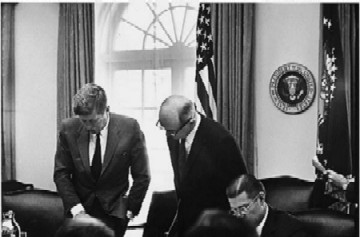

The Cuban Missile Crisis (IP35520)
The actions of the Soviet Union, Cuba and the United States in October 1962 brought those nations to the verge of military conflict. What was not known then, and what is not fully recognized today, was how close the world came to the brink of nuclear disaster. Neither the Soviet Union, nor Cuba, nor the United States intended by its actions, to create such risks… the missile crisis was a dramatic demonstration of human fallibility, of the degree to which political and military leaders are so often captives of misinformation, misjudgment, miscalculation. We all make mistakes. In our daily lives, mistakes are costly, but we try to learn from them. In conventional war, mistakes cost lives, sometimes thousands of lives. But if mistakes were to affect decisions relating to nuclear forces, they will result in the destruction of nations. (Robert McNamara, November 1993).
1. Aims and Objectives
a. Aims
In October 1962 Cold War came close to nuclear war. Ever since scholars, political leaders and military officials have pondered and debated how close we were to Armageddon. The causes, courses and consequences of the crisis continue to generate debate and disagreement among academics and surviving participants on all sides. The aim of the course is to explore these various debates, and examine how historians, political scientists and students of crisis management analyse the events of 1962. A second aim is show how the study of the crisis illuminates various aspects of scholarship. What, for example, can recent historiography tell us about the opportunities and challenges for historical method, especially now that the Cold War is over? Third, the possible lessons of the crisis for diplomacy and crisis management are studied not just in the Cold War context, but in the age of weapons of mass destruction, which we still inhabit.
b. Objectives
By the end of the module the student should be able to:
* evaluate debates about the origins, dynamics and conclusion of the crisis
* adjudicate upon how close the world came to nuclear war in 1962
* understand the implications of recent scholarship for the interpretations of historians,
political scientists and students of crisis management
* analyse the possible lessons of the crisis for the conduct of international affairs
2. Teaching Outline
The course consists of ten weekly lectures and six seminars:
Lectures :
1. Introduction : Origins of the Crisis
2. Dynamics of the Crisis
3. Resolution of the Crisis
4. Historiography and Revisionism
5. The Role of Nuclear Weapons
6. Soviet and Cuban perspectives
7. The roles of Kennedy and Khrushchev
8. Britain and the Missile Crisis
9. Lessons of the Crisis
10. Video
11. Film
The first lecture on this module will at 10am in A14 Hugh Owen Building on Thursday 7 February. It is essential that all students taking the module attend this first lecture. All seminar groups meet in the first week for one hour. Details of seminar arrangements will be provided at the first lecture on 1 October. Thereafter seminars groups meet for two hours every fortnight. Details will be given at the first lecture and displayed on Dr Scott’s noticeboard by Room S7. The seminar times/venues are as follows:
Tuesday 10am to 12 noon Room C65
Wednesday 11-10pm to 1pm Room C65
Friday 3-10pm to 5pm Room C65
Seminars:
1. Origins: Soviet
2. Origins: American
3. Dynamics and Resolution
4. The Role of Nuclear Weapons
5. Soviet Views
6. Lessons and Overview
The course is taught by Dr Len Scott (Room S7; email: lvs@aber.ac.uk) and Dr Gerry Hughes (Department of History and Welsh History; e-mail: rbh@aber.ac.uk).
Seminars
Each seminar comprises a role-playing exercise and a discussion of themes and issues. The role-playing exercise is designed to illuminate the various themes, and encourage preparation for, and involvement, in seminar work. It is intended to be a group activity in which students meet outside the formal sessions and plan their approaches together.
Picture: Students conferring in
a recent role-playing seminar in C65 (Llandinam building, UWA) Seminar 1 Origins: Soviet Role-playing exercise It is April 1962 You are a group of Soviet officials tasked by Nikita Khrushchev to evaluate
Soviet-American relations and the American threat to Cuba, and to consider
whether deployment of Soviet nuclear weapons there will enhance Cuban security
and serve Soviet interests. Central questions to consider are therefore: · 
·
What kind of nuclear weapons could be deployed (eg. bombers, short range missiles, etc)·
How should the weapons be deployed – openly, in secret, by deceiving the Americans?·
How will President Kennedy respond? What are the implications for Soviet-American relations?You will have 10 minutes to present your evaluation to Premier Khrushchev. Incidentally, you should know that the Premier is now personally committed to deploying nuclear weapons in Cuba, but is always looking for officials with minds of their own and able to run power stations in the more attractive parts of Eastern Siberia.
Suggested reading:
Graham Allison and Philip Zelikow,
Essence of Decision, Explaining the Cuban Missile Crisis(2
nd edition 1999) [Short Loan] pp 78-109; 201-17Lebow R.N. and Stein, J.G.,
We All Lost the Cold War (Princeton, Princeton UniversityPress, 1994) chapters 2 and 3 [Short Loan]
Fursenko, A. and Naftali, T.,
'One Hell of a Gamble': Khrushchev, Castro Kennedy and the CubanMissile Crisis 1958-1964
(1997) chapter 9 [Short Loan]Raymond Garthoff,
Reflections on the Cuban Missile Crisis (1989) chapters 1-2 [Short Loan]